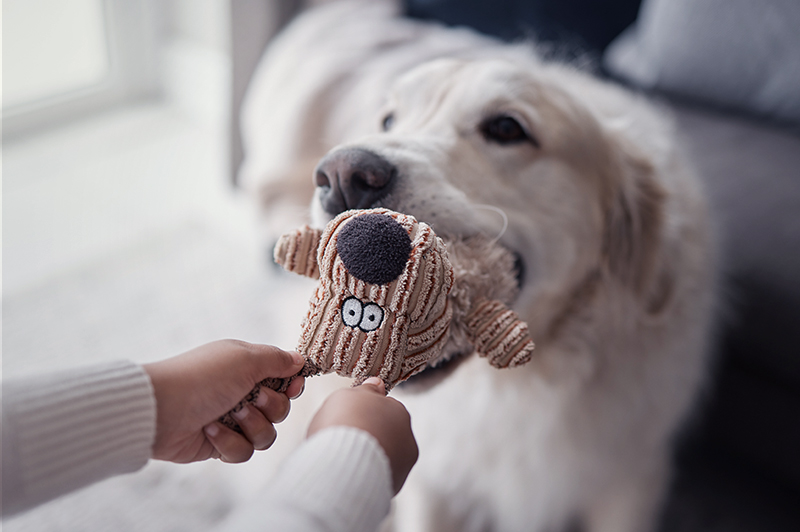Protect your kids from dog bites: Tips from the experts

Working in the Department of Plastic and Oral Surgery at Boston Children’s Hospital, Dr. Carolyn Rogers-Vizena treats many young patients with dog bites. “We see everything from small lacerations that can be repaired in the Emergency Department, to bone-crushing facial injuries that require multiple reconstructive operations,” she says.
No matter the severity, dog bites happen every day, and for the most part, they are avoidable. Local veterinarian Dr. Neil Storey teams up with Rogers-Vizena to answer parent’s questions to help their children enjoy man’s best friend in the safest and healthiest ways possible.
Are there certain breeds I should steer clear from adopting?
Bringing your new, furry friend home for the first time is an exciting moment. But before jumping into the adoption process, Storey urges families to first consider their wants and needs. “Don’t get the wrong breed of dog for the wrong situation,” he says. “Adopt from a reputable breeder or from a shelter where knowledgeable staff can assess the dog’s suitability for the family.” No two families are alike, and neither are dogs. Doing research ahead of time will ensure your new dog fits perfectly into your own unique family.
When considering a specific breed, Storey cautions that statistics can be skewed, as some breeds are more popular than others. “Bites from Labrador retrievers may top the list, but German shepherds, pit bull types, Rottweilers, chows, and chihuahuas have a higher tendency,” he says. Rogers-Vizena adds that certain breeds have incredible power and can cause a lot of damage with just one bite. “The most serious bites I have cared for are from pit bulls, Rottweilers, and Akitas,” she says.
What can I do to reduce my dog’s aggression?
The good news is there are a number of ways to reduce your dog’s aggression from the get-go. Storey’s top tips:
- Consider immediately spaying or neutering your new dog, as spayed and neutered dogs are less likely to bite.
- Socialize your dog with dogs, people and in various situations.
- Train your dog with a “nothing in life is free” approach, which includes positive reinforcement and rewards, not punishment. “Start puppy classes as soon as possible,” says Storey.
- Do not engage your puppy in aggressive play or tug-of-war games.
- Make the dog part of the family; make sure it gets lots of exercise, is supervised and visits the vet regularly.
- Keep your dog healthy because pain or sickness can trigger aggression.
Why would a dog attack my child?
The vast majority of dog bites Rogers-Vizena treats are in children. “Kids may unintentionally provoke a dog they feel comfortable with,” she says. Storey agrees that children may not know how to read a dog they are comfortable with or may approach unfamiliar dogs more readily. “They may disturb dogs that are sleeping or eating, make loud noises, run away from the dog, approach the dog in more threatening ways (hugs from above) or get into aggressive games,” he says.
It is important to teach your kids to interact properly with both familiar and unfamiliar dogs.
What should I do if my child is bitten?
If a dog bite does occur, “do not overreact, as this may lead to an escalation of aggression,” says Storey. He suggests placing your dog in another area of the house or behind a barrier to allow things to calm down. After assessing the injury, Rogers-Vizena suggests seeking medical attention if the injury is more than a simple laceration.
Moving forward, Storey warns not to punish your dog after the event. “The dog will not associate the punishment with the act and may lead to an aggressive response or instill fearfulness,” he says. After things have calmed down, he suggests asking these questions: “How did it happen? Were other dogs or people involved? Was the dog in pain or feeling threatened?” In answering these questions, you may need the input of a behaviorist, trainer or veterinarian.
Whether you already have a dog or are considering adopting one, they can be a wonderful addition to any family, providing invaluable companionship to both you and your children. However, it is up to you to facilitate a respectful and loving relationship between your child and your dog, and while it can be hard work, it is more than worth it
About the experts:
Carolyn Rogers-Vizena, MD, is plastic surgeon at Boston Children’s Hospital and an assistant professor at Harvard Medical School. Dr. Neil Storey is the medical director at Weston Veterinary Clinic in Massachusetts. He has been in small animal practice for 22 years.
Learn more about the Department of Plastic and Oral Surgery.
Related Posts :
-

Help your child manage anxiety about school violence
With news of school shootings and other violence often reaching children, parents sometimes grapple with how to help their child ...
-

Which pain medication is right for your child? What a pediatrician wants parents to know
There’s no shortage of safe and effective pain medications for children. Acetaminophen (commonly known as Tylenol), ibuprofen (Motrin, Advil), ...
-

Understanding and treating Mason’s congenital nevus
Kim and Ryan noticed their son’s birthmark almost immediately after he was born. They knew birthmarks were common, but ...
-

Status epilepticus: What’s changed, what to know, and a global perspective
Status epilepticus, or a prolonged seizure lasting more than five minutes, is a rare complication of epilepsy and a medical ...





